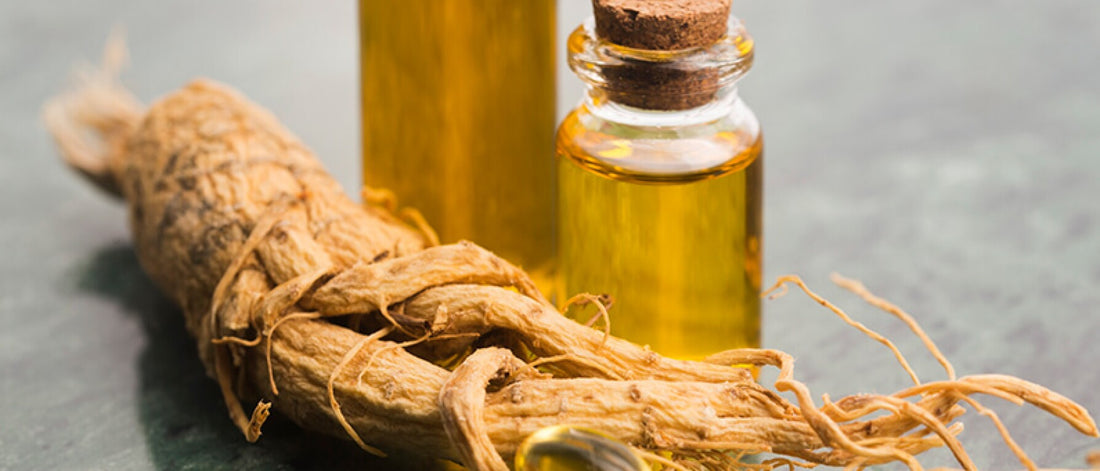You have probably heard of the gnarly but potent root and brightly colored berry known as ginseng. Ginseng has been used in Asia and North America for centuries in both Native American medicine and Traditional Chinese Medicine. Native Americans used ginseng both as a digestive tonic and to soothe headaches, whereas Traditional Chinese Medicine used ginseng to boost energy and vitality, manage diabetes, and support sexual health.
Today, many folks are turning to ginseng as a natural remedy to elevate energy, enhance memory, decrease inflammation, boost sexual function, and more. In fact, ginseng is among the most popular and best-selling natural remedies in the world because of its many health benefits.
Ginseng belongs to the genus Panax, which means “all healing” in Greek. The compounds unique to the ginseng plant (and under the most research) are called ginsenosides. Ginsenosides are the most active pharmacological compound of the ginseng plant and are responsible for many of the health benefits—such as their role in managing inflammation and strengthening the immune system.
Be sure to keep reading and learn how ginseng benefits range from helping with your memory to cancer prevention.
A study conducted by Centre for the Study of Natural Medicines and Neurocognition, Brain Sciences Institute, looked at a group of 32 healthy young adults and their acute mood and neurocognitive function. The study looked at the effects one, three, and six hours after the administration of American ginseng root—three doses (100, 200, and 400 mg) of Cereboost (P. quinquefolius confirmed at 10.65 percent ginsenosides). What was observed was a significant enhancement of working memory function.
This suggests that ginseng benefits brain health, cognitive function, and memory. Although more research is needed of other populations, there is evidence that American ginseng root is a great brain food that could help your brain function at its best.
Treating inflammation with daily health practices (such as eating an anti-inflammatory diet, supplementation, exercise, stress management, and sleep) is a sure approach to begin to address the chronic health issues many people face.
Ginseng may be a wonderful ingredient to include in such a health plan. One study addressed the various qualities of Korean red ginseng on the in vitro (taking place in outside the body such as in a test tube or petri dish) inflammatory responses of activated (inflamed) cells. The results confirmed a direct inhibition of inflammatory responses of the cells, suggesting ginseng as a strong anti-inflammatory remedy.
While there are many foods with strong anti-inflammatory qualities (such as blueberries, cumin, and turmeric to name just a few), ginseng is among some of the most the potent and effective choices to keep your inflammation at bay.
While more research is needed in the field of men’s testosterone health, more and more men are suffering from a decline of testosterone. This is hypothesized to be due to the overload of toxic chemicals (known as endocrine-disrupting toxins) found in the world. Many of these chemicals are common to everyday living. Research is exploring how these chemicals can interfere with testosterone production in men.
One study looked at both the efficacy and safety of the ginseng berry on men with erectile dysfunction (ED). The study looked at a group of 119 men with mild-to-moderate erectile dysfunction. Each participant was administered four, 350 mg capsules of ginseng per day, for eight weeks. The results showed that ginseng is an efficacious and easily tolerated approach to improved sexual health in men with ED, improving both sexual function and satisfaction.
Ginseng may be just the remedy you need to explore to amplify your sexual function.
Ginseng may be an ingredient to consider as a natural way to help lower blood sugar levels in those struggling with type 2 diabetes (or pre-diabetes).
One study looked at a group of 19 participants with type 2 diabetes. Each participant received two grams of Korean red ginseng per meal (or six grams per day), or a placebo, for 12 weeks, in addition to their current anti-diabetic regiment. The results of the study show improved glycemic control (the delicate balance of insulin replacement with diet and exercise).
Another study, using Panax ginseng, showed a significant reduction in blood glucose levels when tested on 3T3-L1 cells (cells used for biological research), after just one hour of the consumption of glucose. The study confirmed that ginsenoside (the active pharmacological compound in ginseng) reduces insulin resistance.
In summary, ginseng-related therapy for blood sugar management, especially type 2 diabetes and pre-diabetes management and prevention, shows much promise for improved glycemic control and the reduction of insulin resistance with ensured safety.
Often known as chemoprevention (using substances to lower the risk or stop the progression of cancer), there are many natural remedies (along with conventional treatments) to ward off, prevent, suppress, and treat cancer in its many forms.
A meta-analysis evaluated the impact of ginseng consumption on cancer treatment and prevention. The analysis looked at nine studies, including five cohort studies, three case-control studies, and one randomized controlled trial. The results of the meta-analysis showed that consuming ginseng correlated to a decrease in the risk of (non–organ-specific) cancer.
Ginseng is high in antioxidants and anti-cancer properties, making it a solid candidate for chemoprevention.
One study looked at a group of 36 Canadian children between the ages of 3 and 17 years old who matched the diagnostic criteria for ADHD. The children were administered 200 mg of North American ginseng extract Panax quinquefolium and 50 mg of Ginkgo biloba extract twice per day by their parents. The results showed a significant improvement in each of the troublesome areas for ADHD patients—hyperactivity, cognitive problems, and oppositional behavior. The study concluded that there is more research needed but that the protocol used may effectively treat both behavioral and cognitive challenges experienced by children with ADHD.
Another study, using a Korean red ginseng dosage of 1,000 mg twice per day for eight weeks, was administered to a group of 18 children between the ages of 6 and 14 years, diagnosed with ADHD. The results showed that ginseng is a supportive, safe, and complementary therapy for children with ADHD. (Researchers also noted that more research is needed in this area of study.)
This suggests that ginseng may be a wise addition to support ADHD in children improving cognition, anxiety, and social function.
Ginseng can be used in many ways. Try it raw, gently steamed, taken in a capsule, made into a tea, or even finely chopped and added to a stir-fry. There are a ton of ginseng products out there to suit your tastes and preferences. Ginseng is a powerful and medicinal food and remedy that can benefit many aspects of your health. Enjoy ginseng benefits however you can to improve your overall quality of life!
*Editor’s Note: The information in this article is intended for your educational use only; it does not necessarily reflect the opinions of the Chopra Center's Mind-Body Medical Group; and is not a substitute for professional medical advice, diagnosis, or treatment. Always seek the advice of your physician or other qualified health providers with any questions you may have regarding a medical condition and before undertaking any diet, supplement, fitness, or other health programs.
Today, many folks are turning to ginseng as a natural remedy to elevate energy, enhance memory, decrease inflammation, boost sexual function, and more. In fact, ginseng is among the most popular and best-selling natural remedies in the world because of its many health benefits.
Ginseng belongs to the genus Panax, which means “all healing” in Greek. The compounds unique to the ginseng plant (and under the most research) are called ginsenosides. Ginsenosides are the most active pharmacological compound of the ginseng plant and are responsible for many of the health benefits—such as their role in managing inflammation and strengthening the immune system.
Be sure to keep reading and learn how ginseng benefits range from helping with your memory to cancer prevention.
1. Improved Memory
How’s your memory? With the hustle and bustle of daily life, your cognitive function is most often under high demand. It can feel hard to keep up with the fast pace of information, communication, and mental acuity that comes with most of your days. Today, many people turn to ginseng to support healthy brain function, increase mental acuity, and enhance memory. Ginseng stimulates and supports cognitive function and concentration.A study conducted by Centre for the Study of Natural Medicines and Neurocognition, Brain Sciences Institute, looked at a group of 32 healthy young adults and their acute mood and neurocognitive function. The study looked at the effects one, three, and six hours after the administration of American ginseng root—three doses (100, 200, and 400 mg) of Cereboost (P. quinquefolius confirmed at 10.65 percent ginsenosides). What was observed was a significant enhancement of working memory function.
This suggests that ginseng benefits brain health, cognitive function, and memory. Although more research is needed of other populations, there is evidence that American ginseng root is a great brain food that could help your brain function at its best.
2. Anti-Inflammatory Support
The majority of the most common modern health issues are directly related to chronic inflammation in the body. Chronic stress, poor dietary habits, and a sedentary lifestyle contribute to the chronic inflammation, considered the underlying cause of many health issues, such as heart disease, type 2 diabetes, ALS (amyotrophic lateral sclerosis), autoimmunity, and even asthma.Treating inflammation with daily health practices (such as eating an anti-inflammatory diet, supplementation, exercise, stress management, and sleep) is a sure approach to begin to address the chronic health issues many people face.
Ginseng may be a wonderful ingredient to include in such a health plan. One study addressed the various qualities of Korean red ginseng on the in vitro (taking place in outside the body such as in a test tube or petri dish) inflammatory responses of activated (inflamed) cells. The results confirmed a direct inhibition of inflammatory responses of the cells, suggesting ginseng as a strong anti-inflammatory remedy.
While there are many foods with strong anti-inflammatory qualities (such as blueberries, cumin, and turmeric to name just a few), ginseng is among some of the most the potent and effective choices to keep your inflammation at bay.
3. Enhanced Sexual Function
Ginseng is a dynamic remedy known for supporting a wide range of health and healing in the body, including sexual function. Korean ginseng has been used for centuries to treat impotence.While more research is needed in the field of men’s testosterone health, more and more men are suffering from a decline of testosterone. This is hypothesized to be due to the overload of toxic chemicals (known as endocrine-disrupting toxins) found in the world. Many of these chemicals are common to everyday living. Research is exploring how these chemicals can interfere with testosterone production in men.
One study looked at both the efficacy and safety of the ginseng berry on men with erectile dysfunction (ED). The study looked at a group of 119 men with mild-to-moderate erectile dysfunction. Each participant was administered four, 350 mg capsules of ginseng per day, for eight weeks. The results showed that ginseng is an efficacious and easily tolerated approach to improved sexual health in men with ED, improving both sexual function and satisfaction.
Ginseng may be just the remedy you need to explore to amplify your sexual function.
4. Diabetes Management
According to the CDC (Centers for Disease Control and Prevention), more than 100 million people suffer with type 2 diabetes or pre-diabetes in the U.S. The CDC also notes that there are many scientifically supported ways to manage or prevent diabetes—through exercise, diet, and use of insulin and other medications that manage blood sugar levels—although there are many other health issues that stem from this condition. Secondary conditions, especially those related to the eyes, kidneys, nervous system, and heart, can create a domino of health issues that you would surely like to avoid.Ginseng may be an ingredient to consider as a natural way to help lower blood sugar levels in those struggling with type 2 diabetes (or pre-diabetes).
One study looked at a group of 19 participants with type 2 diabetes. Each participant received two grams of Korean red ginseng per meal (or six grams per day), or a placebo, for 12 weeks, in addition to their current anti-diabetic regiment. The results of the study show improved glycemic control (the delicate balance of insulin replacement with diet and exercise).
Another study, using Panax ginseng, showed a significant reduction in blood glucose levels when tested on 3T3-L1 cells (cells used for biological research), after just one hour of the consumption of glucose. The study confirmed that ginsenoside (the active pharmacological compound in ginseng) reduces insulin resistance.
In summary, ginseng-related therapy for blood sugar management, especially type 2 diabetes and pre-diabetes management and prevention, shows much promise for improved glycemic control and the reduction of insulin resistance with ensured safety.
5. Cancer Prevention
Cancer imposes a threat to many people across the globe. While there are many factors to consider that may contribute to cancer, it is known that lifestyle can surely influence the expression of genes that cause many kinds of cancer. There are many supportive ingredients, foods, remedies, and health practices to consider implementing to maintain your health and vitality in today’s world.Often known as chemoprevention (using substances to lower the risk or stop the progression of cancer), there are many natural remedies (along with conventional treatments) to ward off, prevent, suppress, and treat cancer in its many forms.
A meta-analysis evaluated the impact of ginseng consumption on cancer treatment and prevention. The analysis looked at nine studies, including five cohort studies, three case-control studies, and one randomized controlled trial. The results of the meta-analysis showed that consuming ginseng correlated to a decrease in the risk of (non–organ-specific) cancer.
Ginseng is high in antioxidants and anti-cancer properties, making it a solid candidate for chemoprevention.
6. ADHD Treatment
According to the CDC, 11 percent of children aged 4 to 17 years have been diagnosed with attention deficit hyperactivity disorder (ADHD) as of 2011. As mentioned, ginseng has the ability to enhance cognitive function and memory.One study looked at a group of 36 Canadian children between the ages of 3 and 17 years old who matched the diagnostic criteria for ADHD. The children were administered 200 mg of North American ginseng extract Panax quinquefolium and 50 mg of Ginkgo biloba extract twice per day by their parents. The results showed a significant improvement in each of the troublesome areas for ADHD patients—hyperactivity, cognitive problems, and oppositional behavior. The study concluded that there is more research needed but that the protocol used may effectively treat both behavioral and cognitive challenges experienced by children with ADHD.
Another study, using a Korean red ginseng dosage of 1,000 mg twice per day for eight weeks, was administered to a group of 18 children between the ages of 6 and 14 years, diagnosed with ADHD. The results showed that ginseng is a supportive, safe, and complementary therapy for children with ADHD. (Researchers also noted that more research is needed in this area of study.)
This suggests that ginseng may be a wise addition to support ADHD in children improving cognition, anxiety, and social function.
Ginseng can be used in many ways. Try it raw, gently steamed, taken in a capsule, made into a tea, or even finely chopped and added to a stir-fry. There are a ton of ginseng products out there to suit your tastes and preferences. Ginseng is a powerful and medicinal food and remedy that can benefit many aspects of your health. Enjoy ginseng benefits however you can to improve your overall quality of life!
*Editor’s Note: The information in this article is intended for your educational use only; it does not necessarily reflect the opinions of the Chopra Center's Mind-Body Medical Group; and is not a substitute for professional medical advice, diagnosis, or treatment. Always seek the advice of your physician or other qualified health providers with any questions you may have regarding a medical condition and before undertaking any diet, supplement, fitness, or other health programs.






















